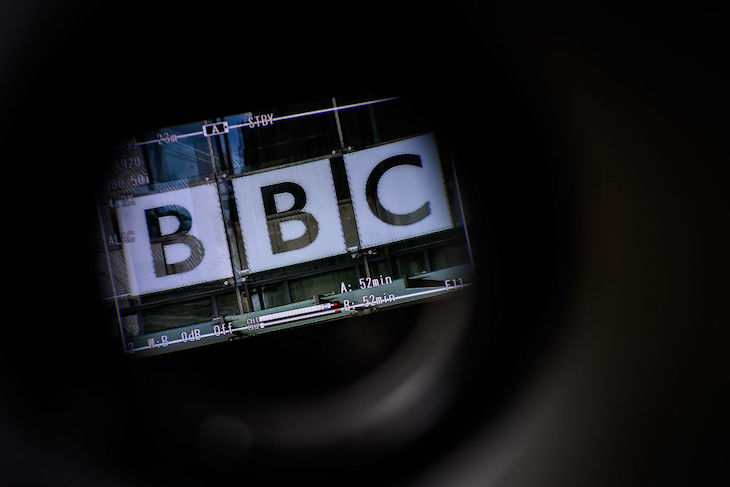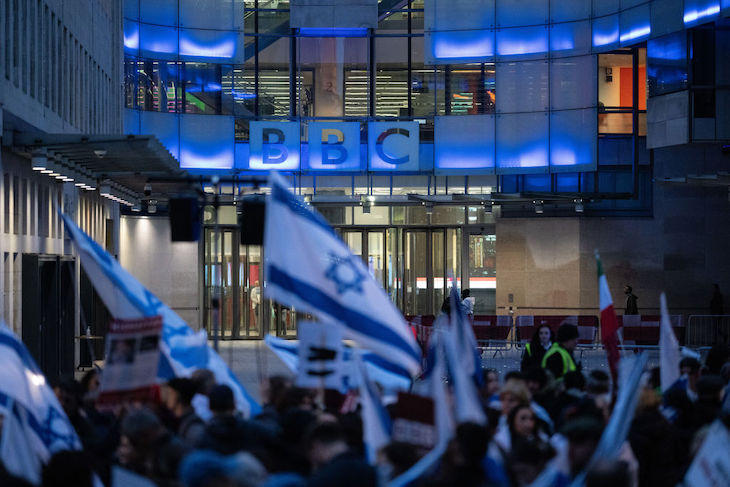The double-decapitating explosion over BBC bias is a gift for commentators, but much of the commentary misses a key central point. It is not just that the BBC is paid for by a compulsory tax on television ownership, which people are sent to jail for not paying. But just as importantly, it enjoys a position of unrivalled, semi-monopolistic power in our national debate.
This BBC morning editorial meeting is group think in institutionalised form
Some of those on the left often love to complain, normally alluding to one Rupert Murdoch, about concentration of power in the media, and the need for diverse sources of journalism. But Mr Murdoch’s power pales into insignificance when compared to that of the BBC, which enjoys nearly half of all the UK’s TV and radio news audience (and broadcasting has far more impact on public opinion than print). Add on top of that the rest of the BBC output, from Question Time to The Archers to CBBC, and you can see that the BBC has an absolutely unrivalled impact on our national debate. There are few countries in the free world with such a concentration of journalistic power as exists in the UK.
That is – or should be – anathema to anyone who believes in plurality in the media. It would matter less if the BBC were capable of reflecting a diversity of viewpoints across its hundreds of different outlets. So what if some programmes reflect left-liberal bias if others were a bit Reformy in their outlook. So what if the One O’Clock News takes one angle on a story if the World Tonight takes another. However, the BBC has strived to have a single consistent editorial stance across its journalistic output (which is also reflected in lots of its non-journalistic output).
The impact of that is little commented on, but profound. I have interacted with the BBC in almost every conceivable way – as a correspondent there, as an independent pundit, as an MP and as a government minister – and have always been struck by the impact of this concentration of journalistic power.
I first noticed it as economics correspondent at the BBC, working across all its TV and radio output, including national TV news and the Today programme. In the run up to a the 1997 election, I left a 45 second Sunday-for-Monday voice piece about a report from Oxford Economic Forecasting saying that Britain was about to go bust – just as John Major was launching his campaign saying Britain is booming. I got various calls from the news desk over the weekend about its legitimacy, and was then surprised to see that it led Monday’s Today programme. It carried on leading the BBC TV and Radio news all throughout the day, up to and including Newsnight, where it was the centrepiece of a debate between Chancellor Ken Clarke and shadow chancellor Gordon Brown.
The BBC editorial decision making process had decided it was THE story of the day, across its entire journalistic output. It fell to The Spectator to question in its main leader that week why the BBC had given such prominence to one economic forecast amongst thousands. The Spectator speculated that the BBC thought Oxford Economic Forecasting was part of Oxford University (I didn’t actually; glad to set the record straight after 25 years), and it fitted the BBC’s agenda. But actually the real culprit was the central editorial decision making across half of the UK’s television and radio news output. This just does not happen in other democracies.
I was struck by this centralised BBC power again when I ran Policy Exchange think tank, and we published a report about extremist literature being distributed in British mosques. It was widely covered in the national newspapers (indeed, front page news), but was completed blocked by all BBC outlets. The BBC had decided that it found some methodological irregularities, and so not only killed the story across its entire media empire, but instead ran stories attacking Policy Exchange (the current director Dean Godson put up a brave defence on Newsnight, which dedicated almost a whole episode to us). A single editorial decision, effectively by one person, decided the coverage across half the UK’s TV and radio news.
Every day the editors of BBC news programmes get together in a morning editorial meeting to decide what the main stories are, which stories to kill, and what the line should be on all those they cover. I occasionally had to attend if one of my stories was expected to be the lead. This morning editorial meeting is group think in institutionalised form. It stops any independent thinking amongst programme editors. I understand the desire for consistency across its output, but the explicit purpose of this meeting is to prevent plurality across half the UK’s TV and radio news.
This centralised editorial decision making is why groups like Stonewall can capture the entire BBC output, or why the BBC across its vast outlets is incapable of reflecting the views of the licence-fee paying public on issues like immigration or Brexit. It is why the first BBC outlet to question the Stonewall orthodoxy was the The Nolan Show in Northern Ireland, just far enough outside the enforced conformity from Broadcasting House to be able to think for itself.
As long as the BBC strives to have a single editorial approach across half the UK’s TV and radio news, it will fall foul of claims of bias one way or another. If we are to have a semi-monopoly of TV and radio news, diversity of journalistic approach should be encouraged, not throttled.







Comments